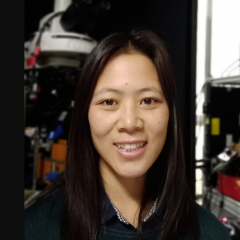Pathological effects of glycine receptor autoantibodies

Professor Carmen Villmann
Institute for Clinical Neurobiology
Julius-Maximilians-University Würzburg
Germany
Title: Pathological effects of glycine receptor autoantibodies
Abstract: Stiff Person Syndrome (SPS) and progressive encephalomyelitis with rigidity and myoclonus (PERM) are rare neurological disorders of the central nervous system. 20% of SPS patients harbour autoantibodies (aAb) against the glycine receptor (GlyR) while in PERM the number is about 50% of patients. In the adult organism, GlyRs are formed by a and b subunits with GlyRb being essential for the synaptic localization of the inhibitory ion channels. Binding of GlyR aAbs to its target has so far been shown exclusively to GlyRα subunits. As pathological mechanisms of the GlyR aAbs, receptor crosslinking followed by internalisation and most likely degradation, complement activation, and direct blocking effect at the functional level have been described. Moreover, our group could demonstrate a significant disturbance in the escape behavior of zebrafish larvae following injection with patient IgG. The generated impaired escape response in the animal model is compatible with stiffness and immobility in humans.
In the GlyRa1 subunit, a common N-terminal binding epitope for the aAbs was identified which is localized at the surface of the protein and thus easily accessible by the aAbs. The extracellular N-terminal domain of the GlyRa1 subunit shares a high degree of sequence homology with GlyRβ making it not unlikely that GlyRβ-specific autoantibodies exist and contribute to the disease pathology. We investigated serum from 58 patients for aAbs with specificity to the GlyRβ subunit. Various cellular approaches were used to define specificity. Most strikingly, aAbs that bind exclusively to GlyRα1 differ in functional consequences for the ion channel from autoantibodies targeting GlyRβ. Altogether, physiological measurements exhibited that GlyRβ aAbs antagonize inhibitory neurotransmission by affecting receptor function rather than localization.
This work is supported by the Germany Research Foundation, SYNABS FOR3004 (VI586).
About Neuroscience Seminars
Neuroscience seminars at the QBI play a major role in the advancement of neuroscience in the Asia-Pacific region. The primary goal of these seminars is to promote excellence in neuroscience through the exchange of ideas, establishing new collaborations and augmenting partnerships already in place.
Seminars in the QBI Auditorium are held on Wednesdays at 12-1pm, which are sometimes simulcast on Zoom (with approval from the speaker). We also occassionally hold seminars from international speakers via Zoom. The days and times of these seminars will vary depending on the time zone of the speaker. Please see each seminar listed below for details.



